Short Analysis on the Ability of Various Counter Strike Maps to
Retain and Draw Players on a Server.
Brian Haskin
Table of Contents:
1. Introduction
2. Method details
3. Player retention
4. Player draw
Introduction:
Throughout my time as a Counterstrike player I have heard fairly
frequent disscusions (arguments) on the ability of particular maps to
draw people into a server or that a certain map drives people
away. Having seen another such discussion last week I realised it would
be fairly simple to parse the logs from a server I help operate and
look at what happens to the number of players over the course of the
different maps.
The first question I wanted to try and answer is, "How well does a map
retain players?". I decided to look at the average number of players
over the course of play for a map to provide this answer. The second
question is, "How well does a map draw players into a server?". For
this I look at the average number of players when a map starts with 6
or less players in the first 2 minutes of the map.
Method details:
For this study I used the logs from a server that has recently moved to
a new IP. Many of the former players did not initially know the new
location and traffic was relatively low. The time period covered is 1
month and 9 days (4-1-04 to 5-10-04). The map cycle contained 9 maps (8
standard, 1 custom) with 7 detonation maps, 1 hostage rescue and 1
non-mission map. Over 200 maps were installed on the server and admins
could switch to any map. The maximum number of players is set at 20.
The timelimit for most
maps is 35 minutes.
The logs were parsed for player join and leave, map change and game
commencing events. The game commencing event is triggered when players
have joined both teams and starts the map time. Any map log that did
not have more than 1 player join was not included in the averages. 31
different maps had been played with multiple players. Maps that had not
been played over 10 times with multiple players were dropped from the
analysis. This left 11 maps for the player retention portion and 7 maps
for the player draw portion.
Each graph shows time played in seconds on the x axis and average
number of players on the y axis.
Player retention:
We would expect a map with good player retention to keep the number of
players flat or increasing for the length of the map. Conversely maps
with poor retention will loose players as the map progresses. The maps
analysed are: cs_italy, de_aztec, de_cbble, de_dust, de_dust2,
de_inferno, de_nuke, de_train, fy_canyon, scoutzelitez and
scoutzknivez_a.
cs_italy
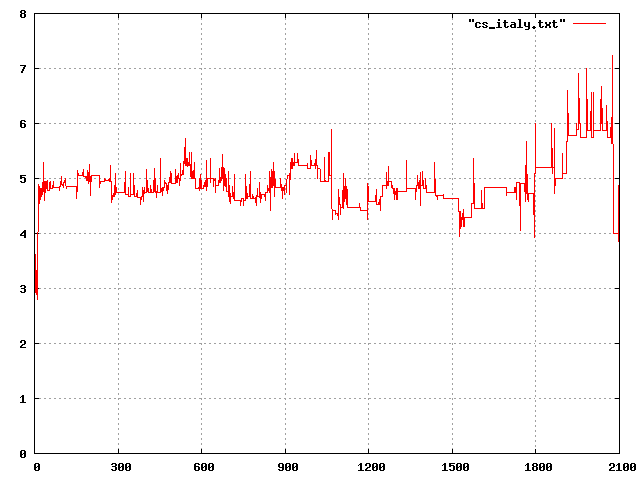
Italy was played 31 times with multiple players. As you can see it
basically keeps a flat line throughout play although there
is a small peak at the end of the map.
de_aztec
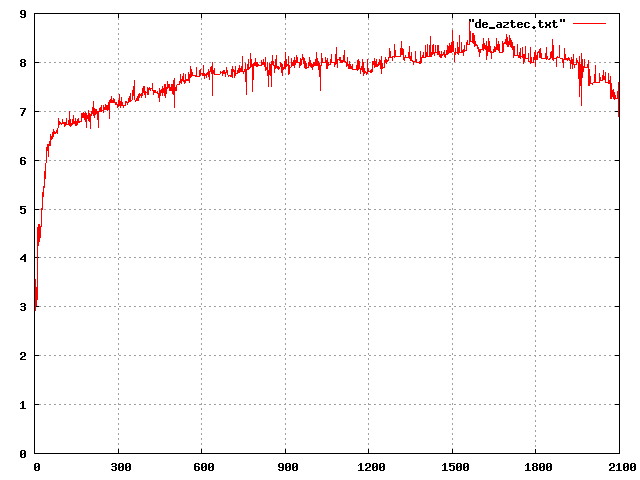
Aztec was played the most at 69 times played with multiple players.
This map definitely holds players and gains until around 32 minutes it
starts to drop off.
de_cbble
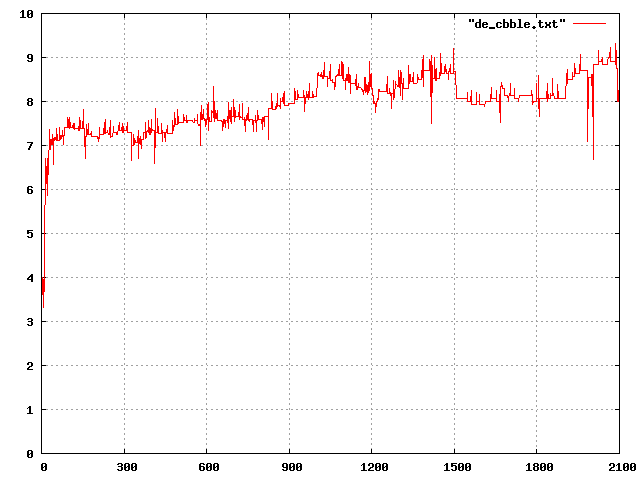
Cobble was played 33 times. It seems to do very well at holding players
and gains an average of about 2.
de_dust
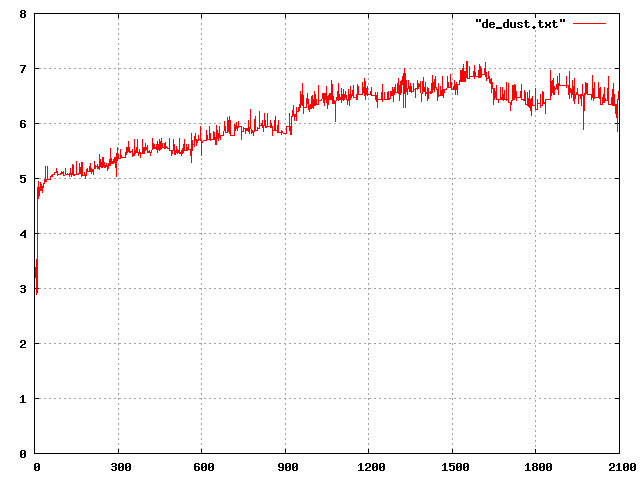
Dust was tied for third most played at 51 times. Dust also does a good
job of holding and gains about 1.5 players on average.
de_dust2
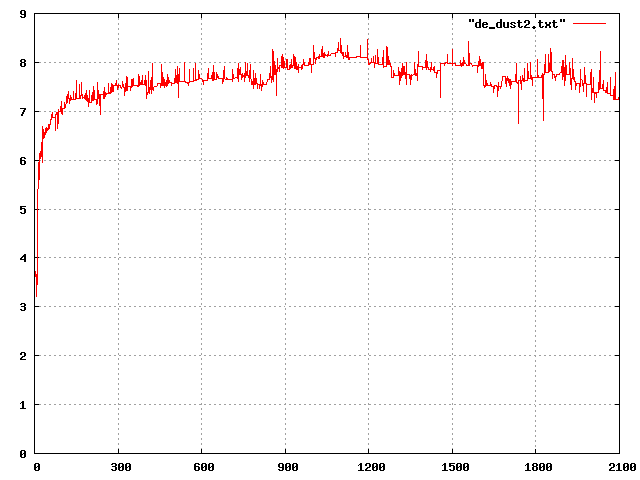
Dust 2 is the other tie for third most played and is also at 51 times
played. Dust 2 also does a good job of retention with possibly a small
drop toward the end.
de_inferno
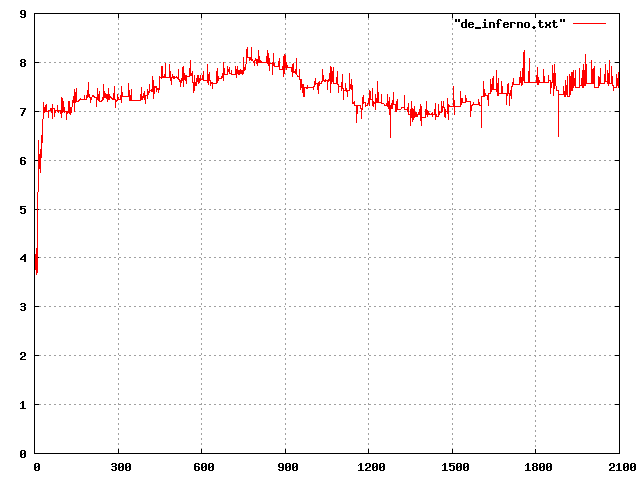
Inferno was played 36 times. It does fairly well at player retention
although it seems to wander around a little more than some of the
others. Gaining a player in the first third before losing it in the
second third, only to come back up half a player in the last third.
de_nuke
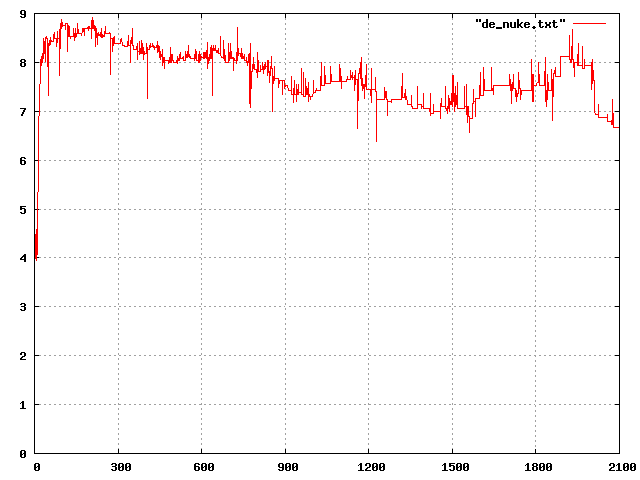
Nuke was 37 times. Nuke has a definite loss of players over time,
although it does rally toward the end of the map. But it finishes at 2
players down from the map start.
de_train
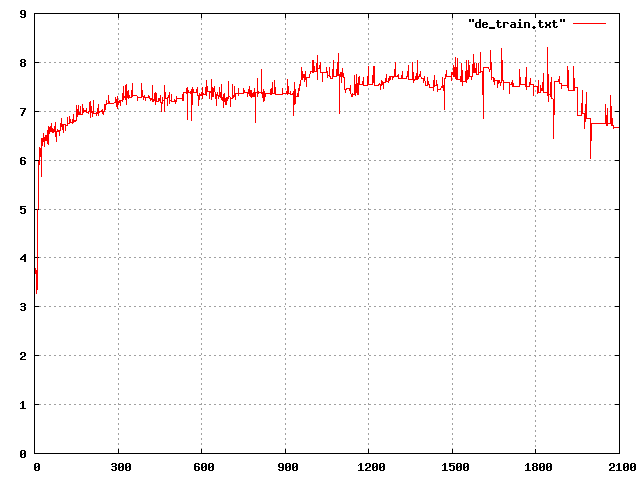
Train was played 43 times. Train does fairly well at holding pretty
steady with it's players, but it does seem to start trending down after
about 27 minutes.
fy_canyon
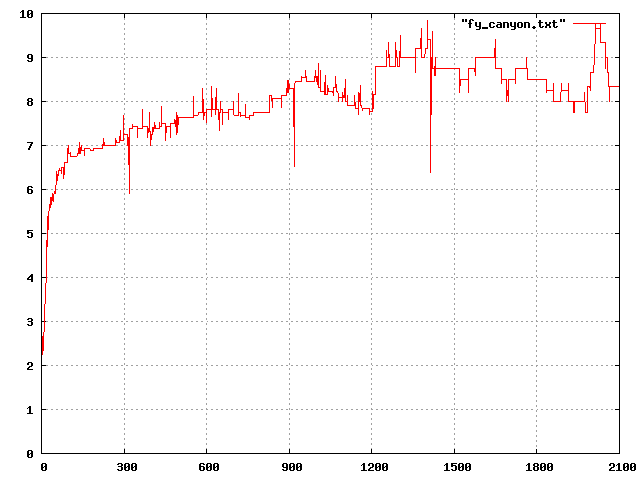
This map was played 17 times. Canyon is a non-mission map that was not
in the default map cycle and was added to the server partway through
the month. Also the timelimit on it was changed to 20 minutes so
several of those times played only went to 1200 seconds. This map seems
to hold and gain people over time.
scoutzelitez
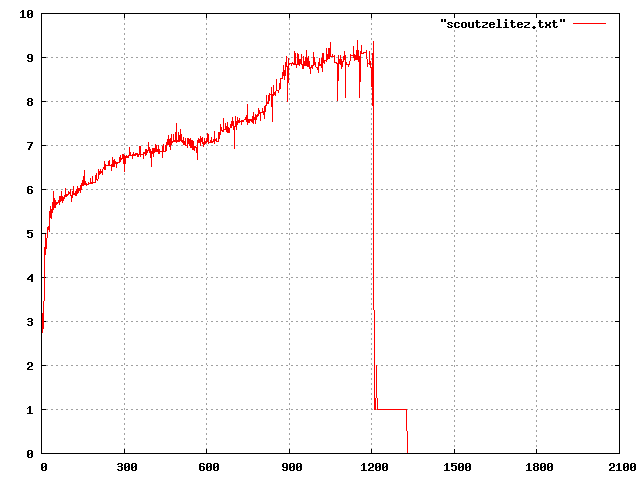
Scoutz Elitez was played 60 times and was the second most played map.
It is a non-mission map that limits player weapons to scouts, dual
elites and knivez. The time limit for this map is set at 20 minutes. It
was a popular map on our server before the move and as you can see does
a very good job of gaining people with an average of 3 people gained
over the course of the map.
scoutzknivez_a
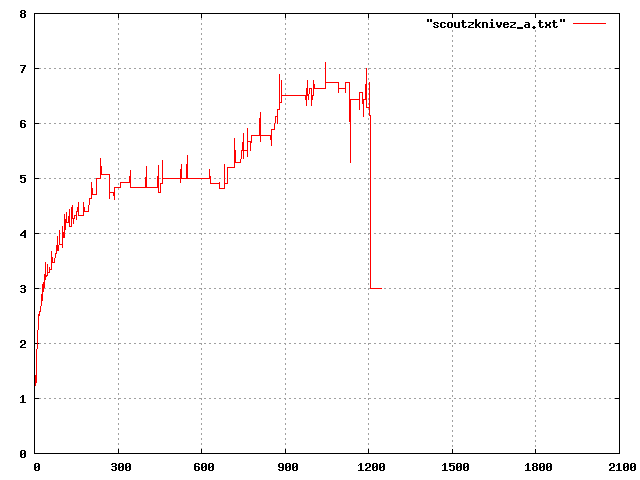
Scoutz and Knivez A was played 13 times. Scoutz and Knivez A limits the
players to scouts and knives with some grenades laying in the center of
the map. This map was the other map besides Canyon that was not in the
default map rotation. It does a good job of retaining and gaining
people as well.
Player draw:
To see how well a map draws people into a server only maps that started
with less than 6 players and had more than 1 player at some point in
the map were looked at. 25 different maps met this criteria, 7 of those
met this 10 or more times and are included here. These maps are:
cs_italy, de_aztec, de_cbble, de_dust, de_dust2, de_train and
scoutzelitez.
cs_italy
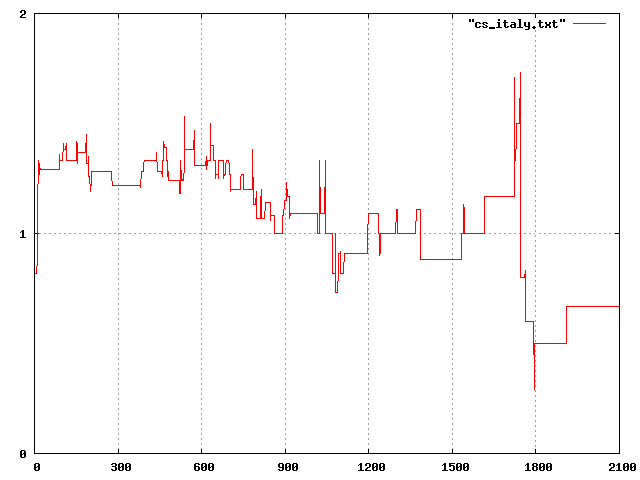
Italy started with less than 6 players 15 times. As you can see when
starting with a low number of players Italy does a poor job of drawing
in new players and has a slow tendency to drain them away.
de_aztec
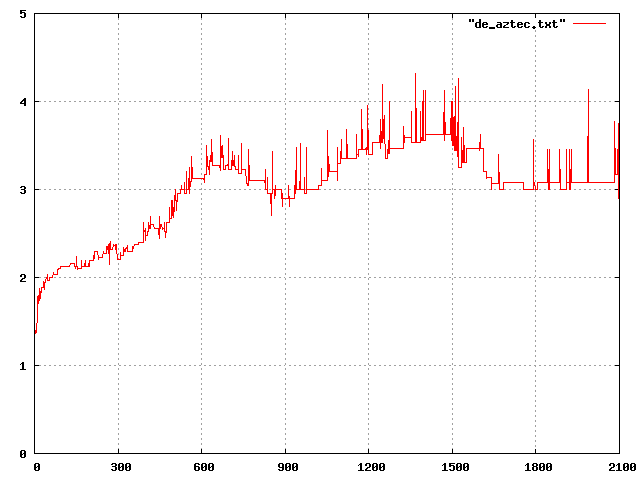
Aztec met the criteria 19 times. It has an average draw of 1 to 1.5
added players over the course of the map.
de_cbble
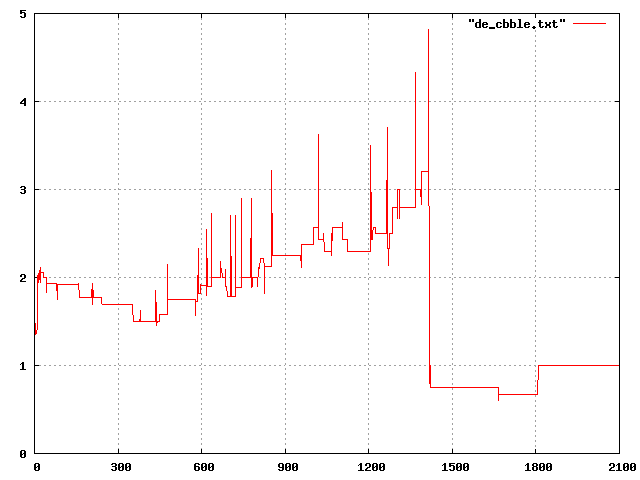
Cobble started with a low player count 11 times. After an initial dip
Cobble seems to be holding on and slowly gaining until around 24
minutes when it crashes straight down to less than 1 player average.
de_dust
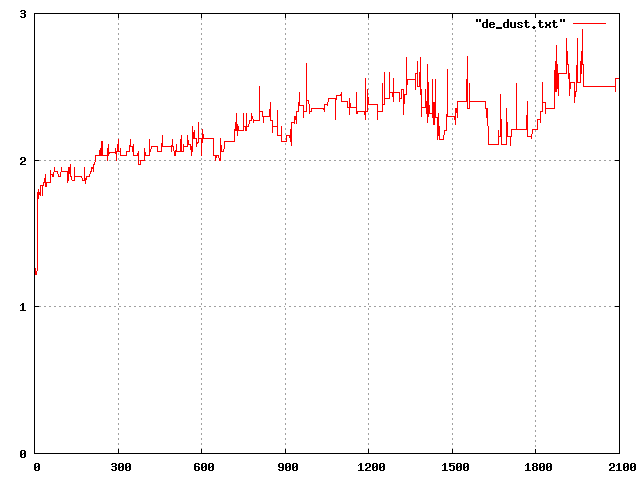
Dust started with less than 6 players 28 times. Dust stays pretty
steady with a slow rise of 0.5 players gained by the end of the map.
de_dust2
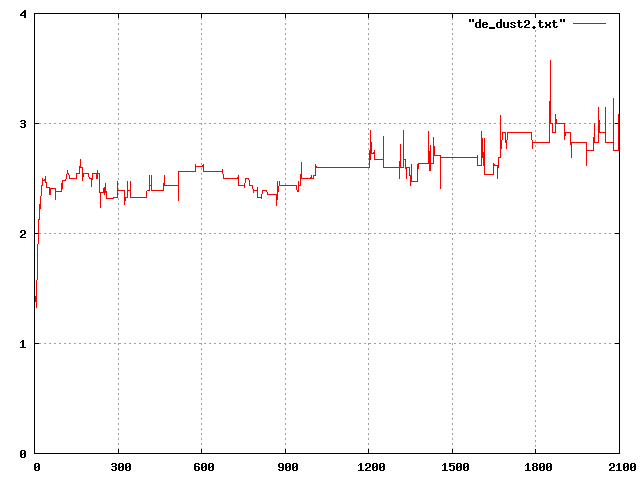
Dust 2 was played 18 times starting with less than 6. It then stays
with an almost flat player count for the rest of the map.
de_train
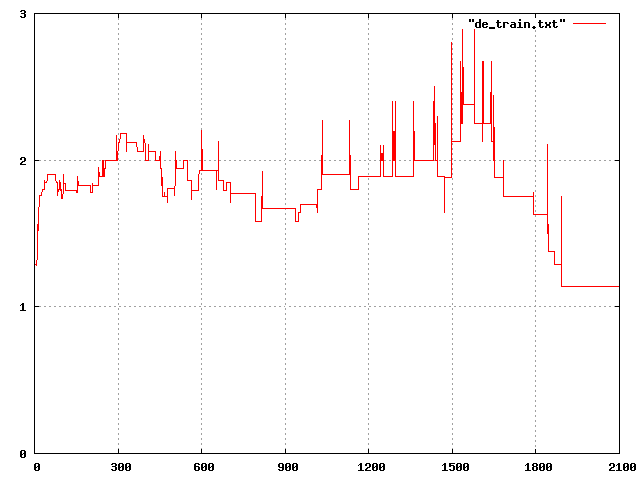
Train started with less than 6 players 11 times. Train varies over the
course of the map, but hangs in there until about 30 minutes when it
drops down to just over 1 player average.
scoutzelitez
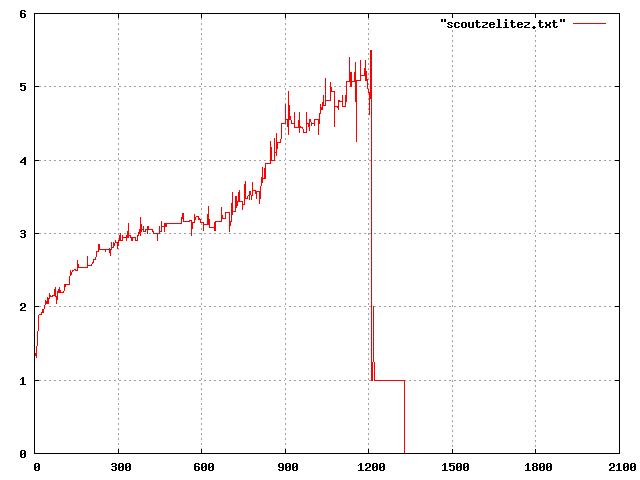
Scoutz Elitez was played 23 times starting with less than 6 players. It
does the best job of the maps seen here of drawing in more players,
adding an average of 2.5-3 players over the course of the map.
Conclusion:
While this is a very small sampling, we see that none of the maps do a
really bad job at retaining people once the server is populated. Even
Nuke, the worst map seen has a
very gradual loss over the course of the map. Looking at maps that
start with very few players there are much larger differences on how
well the map keeps those players and adds new ones.
I think from the results seen in this small set of maps that it would
be interesting to look at more maps, played a higher total number of
times.
Hopefully I will be able to take the logs in another month or two and
expand this study. I think this small sample does show the potential
usefullness for this method to look at how well maps hold and draw new
players.
If you ever want to stop by and contribute to any future graphs, come
play at 67.18.30.189:27015 or say hello at www.specialistclan.com.

















